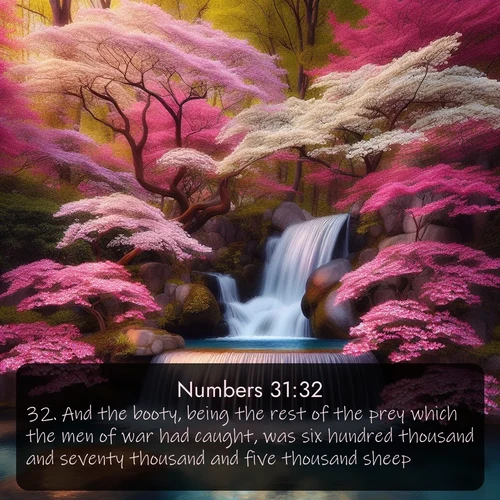Numbers 31:32 plusieurs versions / traductions
English Bible Translations
32. And the booty, being the rest of the prey which the men of war had caught, was six hundred thousand and seventy thousand and five thousand sheep,
32. Now the prey, over and above the booty which the men of war took, was six hundred thousand and seventy thousand and five thousand sheep,
32. Now the beasts taken, in addition to what the fighting-men took for themselves, were six hundred and seventy-five thousand sheep,
32. And the prey, the rest of the spoil, which the men of war had taken, was six hundred and seventy-five thousand sheep,
32. And the booty, being the rest of the prey which the men of war had taken, was six hundred thousand and seventy thousand and five thousand sheep,
32. And the prey, the residue of the spoil which the people of the host have spoiled, is of the flock six hundred thousand, and seventy thousand, and five thousand;
German Bible Translations
32. Und es war die übrige Ausbeute, die das Kriegsvolk geraubt hatte, sechsmal hundert und fünfundsiebzigtausend Schafe,
32. Es betrug aber die Beute, welche das Kriegsvolk geraubt hatte: 675000 Schafe, 270000 Rinder,
French Bible Translations
32. Les prises de guerre, ce qui restait du pillage effectué par ceux qui avaient fait partie de l'armée, consistaient en 675'000 brebis,
32. Le butin, reste du pillage de ceux qui avaient fait partie de l’armée, était de six cent soixante-quinze mille brebis,
32. Le butin, reste du pillage de ceux qui avaient fait partie de l'armée, était de six cent soixante-quinze mille brebis,
32. Et ce qui fut pris, le reste du pillage dont le peuple de l'armée s'était emparé, était de six cent soixante-quinze mille têtes de menu bétail,
32. Or le butin, qui était resté du pillage que le peuple qui était allé à la guerre, avait fait, était de six cent soixante et quinze mille brebis;
32. Or le butin, reste du pillage que le peuple qui était allé à la guerre avait fait, était de six cent soixante et quinze mille brebis,
Versions with Strong Codes
Numbers 31 / KJV_Strong32. And the booty,[H4455] being the rest[H3499] of the prey[H957] which[H834] the men[H5971] of war[H6635] had caught,[H962] was[H1961] six[H8337] hundred[H3967] thousand[H505] and seventy[H7657] thousand[H505] and five[H2568] thousand[H505] sheep,[H6629]
Strong Code definitions
H4455 malqowach mal-ko'-akh from H3947; transitively (in dual) the jaws (as taking food); intransitively, spoil (and captives) (as taken):--booty, jaws, prey.see H3947
H3499 yether yeh'-ther from H3498; properly, an overhanging, i.e. (by implication) an excess, superiority, remainder; also a small rope (as hanging free):--+ abundant, cord, exceeding, excellancy(-ent), what they leave, that hath left, plentifully, remnant, residue,rest, string, with. see H3498
H957 baz baz from H962; plunder:--booty, prey, spoil(-ed). see H962
H834 'aher ash-er' a primitive relative pronoun (of every gender and number); who, which, what, that; also (as an adverb and a conjunction) when, where, how, because, in order that, etc.:--X after, X alike, as (soon as), because, X every, for, + forasmuch, + from whence, + how(-soever), X if, (so) that ((thing) which, wherein), X though, + until, + whatsoever, when, where(+ -as, -in, -of, -on, -soever, -with), which, whilst, + whither(- soever), who(-m, -soever, -se). As it isindeclinable, it is often accompanied by the personal pronoun expletively, used to show the connection.
H5971 `am am from H6004; a people (as a congregated unit); specifically, a tribe (as those of Israel); hence (collectively) troops or attendants; figuratively, a flock:--folk, men, nation, people.see H6004
H6635 tsaba' tsaw-baw' or (feminine) tsbadah {tseb-aw-aw'}; from H6633; a mass of persons (or figuratively, things), especially reg. organized for war (an army); by implication, a campaign, literally or figuratively (specifically, hardship, worship):--appointed time, (+) army, (+) battle, company, host, service, soldiers, waiting upon, war(-fare).see H6633
H962 bazaz baw-zaz' a primitive root; to plunder:--catch, gather, (take) for a prey, rob(-ber), spoil, take (away, spoil), X utterly.
H1961 hayah haw-yaw a primitive root (compare 1933); to exist, i.e. be or become, come to pass (always emphatic, and not a mere copula or auxiliary):--beacon, X altogether, be(-come), accomplished, committed, like), break, cause, come (to pass), do, faint, fall, + follow, happen, X have, last, pertain, quit(one-)self, require, X use. see H1933
H8337 shesh shaysh masculine shishshah {shish-shaw'}; a primitive number; six (as an overplus (see 7797) beyond five or the fingers of the hand); as ord. sixth:--six((-teen, -teenth)), sixth.see H7797
H3967 me'ah may-aw' or metyah {may-yaw'}; properly, a primitive numeral; a hundred; also as a multiplicative and afraction:--hundred((-fold), -th), + sixscore.
H505 'eleph eh'-lef prop, the same as H504; hence (the ox's head being the first letter of the alphabet, and this eventually used as a numeral) a thousand:--thousand.see H504
H7657 shib`iym. shib-eem' multiple of H7651; seventy:--seventy, threescore and ten (+ -teen).see H7651
H505 'eleph eh'-lef prop, the same as H504; hence (the ox's head being the first letter of the alphabet, and this eventually used as a numeral) a thousand:--thousand.see H504
H2568 chamesh khaw-maysh' masculine chamishshah {kham-ish-shaw}; a primitive numeral; five:--fif(-teen), fifth, five (X apiece).
H505 'eleph eh'-lef prop, the same as H504; hence (the ox's head being the first letter of the alphabet, and this eventually used as a numeral) a thousand:--thousand.see H504
H6629 tso'n tsone or tsaown (Psalm 144:13) {tseh-one'}; from an unused root meaning to migrate; a collective name for a flock (of sheep or goats); also figuratively (of men):--(small) cattle, flock(+ -s), lamb (+ -s), sheep((-cote, -fold, -shearer, -herds)).
Prédications qui analysent les thèmes Nombres 31
Thèmes : Vengeance sur Madian; Distribution du butinRelated Sermons discussing Numbers 31
Themes : Vengeance sur Madian; Distribution du butinsee also: Bible Key Verses ; KJV Bible Images, BBE Bible images

